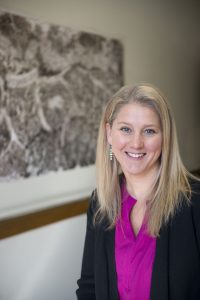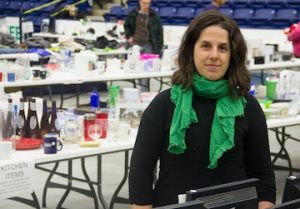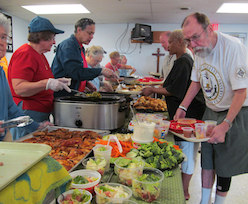Honest Broker
The Mitchell Center helps the Legislature evaluate a bill to reduce food waste and hunger in Maine
When the Maine Legislature’s Joint Standing Committee on Environment and Natural Resources (ENR) needed an independent, outside organization to provide crucial data for Representative Craig Hickman’s proposed Act to Address Hunger, Support Maine Farms and Reduce Waste (Legislative Document 1534), it turned to the Senator George J. Mitchell Center for Sustainability Solutions at UMaine.
Specifically, it asked the Mitchell Center’s Materials Management team to convene a diverse stakeholder working group to identify areas of consensus around the largest problems associated with food waste in Maine and barriers that impede efforts to eliminate, reduce, redistribute or utilize food waste.

The group, which met in early August, was composed of commercial waste producers, retailers, grocers, restaurateurs, waste haulers, organic waste processors, landfillers, farmers, hunger relief and food recovery organizations, gleaning networks, educators, and institutional representatives—including hospitals.
The Materials Management team focuses its work on the life cycle of solid waste materials from raw materials, to products, to end disposal. It combines all aspects of solid waste, including organic food waste, with all forms of diversion to establish a systems approach to this complex topic. The interdisciplinary group is comprised of an anthropologist and a social psychologist, economists, environmental and civil engineers, a food scientist, and a member of the nursing faculty, among others.

Team members Cindy Isenhour, assistant professor of anthropology, and Ph.D. student Brianne Berry have headed up the stakeholder working group charged with coming up with specific recommendations of what to focus on for the final version of LD1534. They are responsible for delivering a final report to the ENR committee. The Stakeholder Working Group’s final Synthesis Report can be viewed here.
“We were selected to convene the working group because the Mitchell Center is seen as being an impartial knowledge broker that doesn’t represent the interest of any particular stakeholder,” says Isenhour. “Our intent is to synthesize stakeholder perspectives and bring them together to provide data that can support decision making without necessarily saying ‘Here’s our recommendation’ but, instead ‘Here’s your range of options and here’s what the stakeholders think are some of the tradeoffs and potential negative and positive impacts.’”
“The exciting thing about the Mitchell Center isn’t just its innovative focus on solutions, but its commitment to serving as an ‘honest broker’ by providing credible, independent analyses of policy options.”
—Roger Pielke Jr., author of “The Honest Broker: Making Sense of Science in Policy and Politics.” More…
The Mitchell Center took the job “because we want to be good partners to the state and our nonprofit and industry sector partners,” Isenhour notes. She adds, “Our goal is to educate the committee to help them better understand what would be the tradeoffs for economy, society, and the environment with different types of options in LD1534. That’s what we hope to do through our report, which we will deliver to the committee in mid-December of this year.”
The report will be in two parts: an outline of the state of food waste in Maine—what it looks like and what the costs are; and, a stakeholder-informed review of potential policy options and a discussion of the tradeoffs.

Through a series of exercises and discussions, the working group considered a variety of approaches and options but finally settled on three policy areas to focus on and carry forward: recycling laws, K-12 education, and food donation.
“The first step we’ve taken is to essentially build a consensus around what might be the best policies to include in LD1534 in its final version,” Isenhour says. “Then, the committee will revise it and it’ll be up again for a vote in the next legislative session.”
Berry, who most recently has been working on the issue of food waste in schools, notes that the Materials Management team is particularly well suited for the task due to its extensive experience engaging with stakeholders around the state.
“Without the diverse and interdisciplinary expertise on our team, I don’t think we could have assembled this group of stakeholders for this task,” Berry says. “For a different group, it could have been easy to get very limited perspectives.”
But, Berry adds, after the working group wrapped things up, “People didn’t want to leave and said things like ‘It’s just so great to be here and have this conversation’ because, after all, how often does a farmer, a grocer, a hauler, a gleaner and others all sit at the same table at the same time and share their concerns?”
—David Sims
